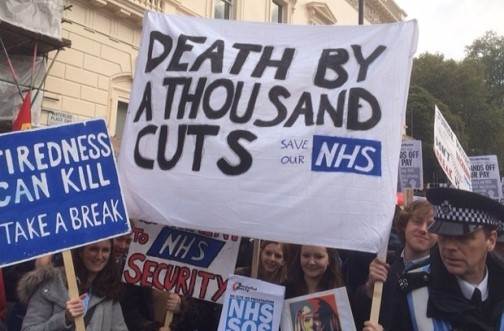Thousands of doctors protested over pay and working conditions in London on Saturday in a growing row between Britain’s medical profession and the government.
Health Secretary Jeremy Hunt plans to reclassify the normal working week of junior doctors to include Saturdays and late evenings, a move critics say would mean pay cuts of up to 30 percent due to the loss of extra payments for working unsociable hours.
Huge crowds gathered in Whitehall, where government offices are located, to listen to speakers decry the move.
Protesters dressed in medical scrubs chanted “Hunt must go” and “Not safe, not fair, Jeremy doesn’t care”.
“The outpouring of anger and frustration we have seen from thousands of junior doctors across the UK, culminating in today’s unprecedented gathering in London, must be a wake-up call for ministers,” said Johann Malawana, the head of the British Medical Association’s junior doctors’ committee, said in a statement.
“If they thought that junior doctors would simply accept their threats of imposition they have been proved very wrong.”
Neither the BMA nor London police could provide a figure for the number of people at the rally, although media reports said 20,000 people attended the demonstration.
Hunt says the changes, which would only apply to doctors in England, would boost patient care by making it affordable for hospitals to put more doctors on weekend rosters and would benefit doctors by reducing their weekly working hours.
Doctors would be compensated for losing extra pay for working unsociable hours by an increase in basic pay.
“I think it is incredibly disappointing, the way that the BMA has misrepresented the government’s position,” Hunt told the BBC.
The BMA is preparing to ballot its members for a potential strike on the issue, while Hunt has urged doctors to return to the negotiating table.

